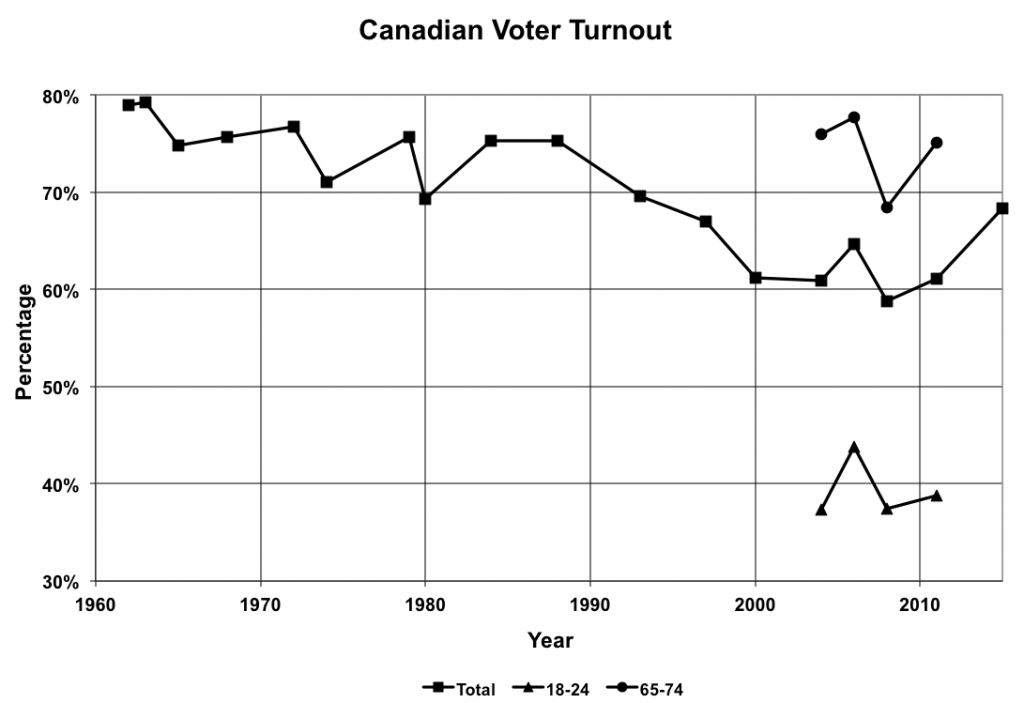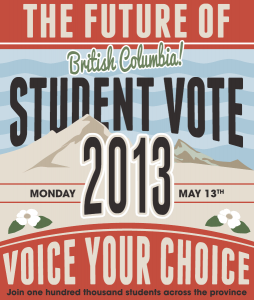Should we Lower the Voting Age to 16? What do you think?
April 20, 2016 By Andrew Weaver 10 comments Community Blog, Education, Issues Blog, K-12 Education, Social Development, Youth
Background
One of the fundamental issues that motivated me to get into politics was that in my view, far too many of our political leaders are shortsighted in their decision-making. That is, too often political opportunism and the quest for re-election are the determining factors and primary motivators in a prevailing short-sighted and short-term political agenda. But that does not serve society well in the long run.
Let me give you three concrete examples.
- Recently, our premier suggested that the solution to the underfunding of public education lay with growing the economy. Fundamentally the B.C. Liberals have it backwards. A quality education is not the luxury of a strong economy. A quality public-education system is what builds a strong economy. Our society has thrived through innovation precisely because of the emphasis we have placed on education. The doctors, engineers, nurses and skilled labour of tomorrow — those who will take care of us as we age — are in the school system today. Surely it’s in all of our long term interests to ensure substantive short term investment in the society of tomorrow.
 We’ve all heard of the Dr. Suess book The Lorax, in which the Once-ler destroys the Truffula forest in a short-sighted quest to produce Thneed garments (“A-fine-something-that-all-people need”). In the end, with the forest gone, the Once-ler’s wealth and prosperity collapses and he lives a depressed life of solitude. The Lorax, published in 1971, beautifully articulates the result of short-sighted and unsustainable resource management. A Loraxian approach to resource management does not protect our renewable resources, natural environment or build public support. Yet this is the approach we are far too often taking in British Columbia, or frankly more broadly in Canada as a whole. It’s a bit like being given a great big inheritance, using that inheritance to throw a huge party, and then waking up the next day broke, with a wicked hangover and asking oneself “Now What?”.
We’ve all heard of the Dr. Suess book The Lorax, in which the Once-ler destroys the Truffula forest in a short-sighted quest to produce Thneed garments (“A-fine-something-that-all-people need”). In the end, with the forest gone, the Once-ler’s wealth and prosperity collapses and he lives a depressed life of solitude. The Lorax, published in 1971, beautifully articulates the result of short-sighted and unsustainable resource management. A Loraxian approach to resource management does not protect our renewable resources, natural environment or build public support. Yet this is the approach we are far too often taking in British Columbia, or frankly more broadly in Canada as a whole. It’s a bit like being given a great big inheritance, using that inheritance to throw a huge party, and then waking up the next day broke, with a wicked hangover and asking oneself “Now What?”.- Right now, it is in every person, in every household, in every municipality, in every city, in every province, in every country in the world’s best interest to do precisely nothing about global warming from a traditional cost-benefit point of view. That is because the costs of action are borne by the individual and the costs of inaction are distributed over 7 billion people in the next generation. Global warming is literally a textbook example of the Tragedy of the Commons with the atmosphere being the shared natural resource.The decisions we make today as to whether or not we put an increasing price on emissions will have profound consequences on the climate, natural and built environment, biodiversity and availability of water over the next century. Yet those making the decisions today will not have to live the consequences of the decisions they are making.
To summarize, most of the grand challenges of our time require decision-makers to look beyond the next election cycle and instead reflect upon the long-term consequences of their decisions. Dealing with poverty, homelessness and the increasing income disparity between the wealthy and the poor, or sustainable resource development, global warming and other environmental issues, or envisioning ways and means of moving towards more steady-state, diversified economies that aren’t subject to wild boom and bust cycles all require us to reflect upon the importance of intergenerational equity. This leads me to pose the following question:
Should the present generation also consider future generations in
the fiscal, social and environmental decisions we make?
I happen to think we do.
Yet herein lies the fundamental problem. Today’s decision-makers don’t have to live the long-term consequences of the decisions they make and those who do are either not allowed to, or are not participating in, our democratic institutions.
 As shown in the figure above, upwards of 70% of seniors over the age of 65 have voted in our recent federal elections. Only around 40% of youth between the ages of 18-24 voted (age-related demographic data likely won’t be available until May for the 2015 federal election). Is it any surprise that many of our political leaders target their promises and messaging to a demographic that they know will vote. I’d wager that when the results become available, we’ll see that the youth participation rose in the 2015 election as it was clear that Prime Minister Trudeau and his Liberal team were discussing values that mattered to the youth of today.
As shown in the figure above, upwards of 70% of seniors over the age of 65 have voted in our recent federal elections. Only around 40% of youth between the ages of 18-24 voted (age-related demographic data likely won’t be available until May for the 2015 federal election). Is it any surprise that many of our political leaders target their promises and messaging to a demographic that they know will vote. I’d wager that when the results become available, we’ll see that the youth participation rose in the 2015 election as it was clear that Prime Minister Trudeau and his Liberal team were discussing values that mattered to the youth of today.
Voting Age History
The voting age was not always 18 in British Columbia and Canada. In fact, it wasn’t until 1970 that the Canada Elections Act was amended to drop the voting age from 21 to 18. In British Columbia we made the jump in two steps. First, in 1952 we dropped the voting age from 21 to 19, but it wasn’t until 1992 that we made the subsequent change to lower the age to 18.
 Around the world more and more jurisdictions are openly discussing the notion of dropping the voting age to 16. In fact, a growing number have actually done so. The most recent and notable example of this occurred in Scotland.
Around the world more and more jurisdictions are openly discussing the notion of dropping the voting age to 16. In fact, a growing number have actually done so. The most recent and notable example of this occurred in Scotland.
Scotland experimented by lowering the voting age in their September 18, 2014 independence referendum. They viewed it as being so successful that they subsequently permanently dropped the voting age to 16 in all future Scottish Parliament and local government elections.
The voting age in Brazil has been 16 since 1988; Austria changed its voting age to 16 in 2007; Argentina dropped the voting age to 16 in 2012. These are but a few of the growing number of jurisdictions that are either considering or already have dropped the voting age to 16 around the world.
The Justification
As I noted above, there has been a disturbing trend of low youth voter turnout in Canadian elections. The non-profit US-based NGO Fair Vote has noted that there is empirical evidence to suggest that “the earlier in life a voter casts their first ballot, the more likely they are to develop voting as a habit.” So while youth turnout might remain low, there is evidence to suggest that there will be increased participation. What’s more, each and every student in the province of British Columbia is required to take Social Studies 11 (or Civic Studies 11 or BC First Nation Studies 12) to fulfill their Social Studies graduation requirement. Unit 1 of the four-unit Social Studies curriculum in the 2005 Integrated Resource package is Politics and Government. While not yet finalized, Politics and Government remains as Unit 1 in the draft 2015 Integrated Resource package.
 Social Studies 11 is a class taken when students are typically sixteen years old. It is an ideal time to engage students on the history and importance of voting. And this sort of experiential learning, wherein direct experience is inserted into the learning environment, has a rich history of validation since the early work of John Dewey in the 1930s. So giving students the ability to vote at the time they are learning about its importance, and knowing that the earlier a voter casts a first ballot, the more likely they are to be lifelong voter, almost certainly will lead to greater voter participation.
Social Studies 11 is a class taken when students are typically sixteen years old. It is an ideal time to engage students on the history and importance of voting. And this sort of experiential learning, wherein direct experience is inserted into the learning environment, has a rich history of validation since the early work of John Dewey in the 1930s. So giving students the ability to vote at the time they are learning about its importance, and knowing that the earlier a voter casts a first ballot, the more likely they are to be lifelong voter, almost certainly will lead to greater voter participation.
As I noted earlier, today’s decision-makers don’t have to live the long-term consequences of the decisions they make and those who do are either not allowed to or are not participating in our democratic institutions. We can do something about the former by reducing the voter age to 16. After all, the youth of day are the leaders of tomorrow and they should have a say in the direction we are heading as they will inherit what we leave them in the years ahead.
Having spent many years as an educator and having presented to, or engaged in discussions with, high school students and classes across British Columbia on numerous occasions, I find it difficult to accept an argument that students are not mature enough of informed enough at age 16 to vote. Students today have access to information like never before; they are tech savvy and they know where to go to get information if they need it.
And of course, there are numerous other arguments, one of the strongest of which is that many youth work and so pay taxes. Taxation without representation is generally counter to our democratic principles. That is, youth must pay the taxes but they are not allowed to vote for those who put in place laws that create them. Other compelling reasons include the fact that we already trust youth to drive at 16, they can get married at 16 (with parents’ permission) and you can drop out of school at 16. These are all pretty major life responsibilities that are entrusted upon our youth.
What do you think?
So tell me what you think? Should we lower the voter age to 16 in the province of British Columbia? There is a trend happening worldwide in the area. Should we lead the way or not? And if not, why not? If so, why?
Latest Posts
Recent Comments
- Adeola on The Paris Agreement is in trouble: UNFCCC needs to ratchet up their climate efforts
- rory murphy on The Paris Agreement is in trouble: UNFCCC needs to ratchet up their climate efforts
- Andrew Weaver on How can BC’s environmental organizations be more effective?
- Andrew Weaver on How can BC’s environmental organizations be more effective?
- Vince Fiorito on How can BC’s environmental organizations be more effective?





10 Comments
If senior citizens that are almost brain dead in a nursing home are allowed to “vote”, then ya 16 year olds should be. There are a lot of idiotic 16 yr olds but most of them are that way because they have idiotic parents. There’s no way to stop stupid immature people from voting because the same stupid 16 year old will be old enough in a short amount of time to vote anyways.
Younger kids are actually more likely to vote against the norm and for change than older people, care about the environment more, etc. 16 year olds voting is definitely against crusty conservative rich people’s best interests, but definitely for change and a better and healthier planet. Young kids dont have to pay taxes or care about tax increases at the moment. They are more likely to support a government that is for change but requires more taxes to do so. Change comes at a cost, and if 16 year olds can vote they will vote for that change, and pay for it in good time. When they start having to pay taxes they will know that it was their own choice and be less likely to bitch about it.
I’m eighteen, I voted in the most recent election, and I think lowering the age of voting is rediculous. My parents learn about their choices through research, they tell me about their research, I went and asked the Law 12 teacher endless questions about terms and who believed in what and voted as informed as I could be. The only people who knew what I was talking about in the school (save for like, ten students and most of the teachers) were the students who took Law class. Most teenagers just liked whatever seemed “cool.”
Teenagers follow trends. Most people I spoke to just said that they liked one party because they “like what they stand for” but don’t even know what they stand for. At sixteen, I was just barely getting taught what left and right wing meant! Sixteen is far too young to vote.
I think that the benefit of increased voter engagement outweighs the cost of “the folly of youth”. If the older demographic is afraid that young people will make uninformed votes, they have a few solutions at hand.
The ideal option is to engage young people in political discussion so that young people are able to make more informed voting decisions.
Even if we accept the assumption that educating young people is unfeasible (owing to hormones or whatever), the 21-50 demographic certainly has the ability to outvote the young by mobilizing their equally life experienced, post-puberty peers.
I think the age to vote should be raised to 21. A 16 year old doesn’t understand or has had enough life experience to be rational in their voting. A prime example is legalizing Marijuana and the youth would jump all over that not considering anything else in the political platform.
I am 16 years old now and I resent these generalizations that all 16 year olds are pot-smoking, uninformed criminals. I worked for the Green Party on the 2015 federal election and I can say from experience that there are a good number of well informed teens that understand the political process and the pros and cons of each policy on the table. It is true there are stoners among us, but they are a minority, and the number is shrinking. Most of us understand the reasons to protect the environment, the reasons that the Harper Conservatives’ proposed Bill C-51 violated our democratic rights, and the ways in which Canada’s First Nations communities have gone unrepresented in Canada. The fact that I clicked this article on Facebook that had been shared by several of my friends and liked by many more is proof of that. On the other hand, I suppose I am a little uninformed. For example, I was unaware the sort of ageism seen in these comments still existed in Canada, let alone BC. So, before you dismiss us as criminals, say that none of us are intelligent because of puberty, or say that our judgement is clouded by wanting marijuana, think about this, and what kind of a person regarding teens this way makes you. Mr. Weaver, I am fully in support of lowering the voting age to 16.
Owen, I completely agree with you. I’ve been presenting in schools/engaging with high school students for years. 16-18 year olds are some of the most educated and informed in our society.
Yes, I agree with the idea of lowering the voting age to 16 if it is accompanied by an increase in the amount of curriculum dealing with Canadian politics in high school social studies. I know a number of extremely socially conscious and engaged 16 year olds, and a lower voting age would encourage more people to get involved in politics earlier. It is a great age for voting and political engagement to be supported by high schools, as opposed to at age 18 when young people are dispersed working, traveling, and being in post-secondary education at different institutions.
Absolutely not! Most 16 year olds are in the midst of the emotional roller-coaster known as puberty or adolescence. We need logical and considered voting decisions made by adults when it comes to the future of our nation. We do not need emotionally susceptible teens determining the course of our future. Come on people, common sense here please!
What an idiotic idea.
Voting age should be raised to 21 at least
I know 18-23 was when I made all my life mistakes, was not mature enough to comprehend life.
25 would be ideal or once you’ve got 3 years of paying taxes and living on your own under your belt
If the school program was more focussed on the rights & responsibilities of citizenship and on current events and issues that would help. We need a more informed and engaged citizenry. I have met some very thoughtful 16 year olds who are more socially conscious than a lot of adults but they seem to be the exception. In my opinion lowering the age should be a process, not a happening.